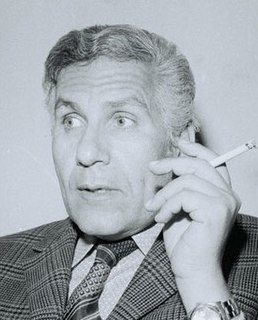A Quote by Aberjhani
Overall, my books represent a kind of shared communion and meditation with my fellow human beings... The books are also a part of what I call the great continuum of spiritual literary dialogue that I feel has been in progress since human beings first gave in to the urge to pray to their sense of something greater than themselves and interpreted certain signs or events or silences as responses to those prayers.
Quote Topics
Also
Been
Beings
Books
Call
Certain
Communion
Continuum
Dialogue
Events
Feel
Fellow
Fellow Human Beings
First
Gave
Great
Greater
Human
Human Being
Human Beings
Interpreted
Kind
Literary
Meditation
Overall
Part
Pray
Prayers
Progress
Represent
Responses
Sense
Shared
Signs
Since
Something
Spiritual
Than
Themselves
Those
Urge
Related Quotes
Artists use frauds to make human beings seem more wonderful than they really are. Dancers show us human beings who move much more gracefully than human beings really move. Films and books and plays show us people talking much more entertainingly than people really talk, make paltry human enterprises seem important. Singers and musicians show us human beings making sounds far more lovely than human beings really make. Architects give us temples in which something marvelous is obviously going on. Actually, practically nothing is going on.
[H]uman beings...make a limit in their mind of what their potential is. They decide, "I've been told this," or "this is what society tells me," or they've been made to believe something. If every human being actually threw away those thoughts...the potential of human beings is great, it's huge, compared to what they actually think of themselves.
Our global institutional arrangements - the basic ground rules that govern our world economy - are human-made. They don't exist naturally, nor are they God-given. We make these rules, those of the WTO [World Trade Organization] Treaty for instance, which fill tens of thousands of pages. These words have been strung together by human beings and are also interpreted and enforced by human beings.
That afternoon he told me that the difference between human beings and animals was that human beings were able to dream while awake. He said the purpose of books was to permit us to exercise that faculty. Art, he said, was a controlled madness… He said books weren't made of themes, which you could write essays about, but of images that inserted themselves into your brain and replaced what you were seeing with your eyes.
It is well for civilization that human beings constantly strive to gain greater and greater rewards, for it is this urge, this ambition, this aspiration that moves men and women to bestir themselves to rise to higher and higher achievement. Individual success is to be won in most instances by studying and diagnosing the kind of rewards human hearts seek today and are likely to seek tomorrow.
Because the Christian God is not a lonely God, but rather a communion of three persons, faith leads human beings into the divine communion. One cannot, however, have a self-enclosed communion with the Triune God- a "foursome," as it were-- for the Christian God is not a private deity. Communion with this God is at once also communion with those others who have entrusted themselves in faith to the same God. Hence one and the same act of faith places a person into a new relationship both with God and with all others who stand in communion with God.
Though we may be genetically wired for temporary happiness, we've also been gifted with the ability to recognize within ourselves a more profound and lasting sense of confidence, peace, and well-being. Among sentient beings, human beings appear to stand alone in their ability to recognize the necessity to forge a bond between reason, emotion, and their instinct to survive, and in doing so create a universe-not only for themselves and the human generations that follow, but also for all creatures who feel pain, fear and suffering-in which we are all able to coexist contentedly and peaceably.







































